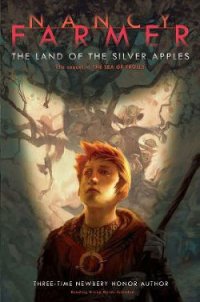Tehanu The Last Book of Earthsea - Le Guin Ursula Kroeber (серии книг читать онлайн бесплатно полностью .TXT) 📗
“In her house, maybe.”
She looked around the kitchen. “But the doors are shut,” she said, “the doors are locked.”
“Because you’re valuable.”
“Oh, yes. We’re precious. So long as we’re powerless. . . . I remember when I first learned that! Kossil threatened me-me, the One Priestess of the Tombs. And I realized that I was helpless. I had the honor; but she had the power, from the God-king, the man. Oh, it made me angry! And frightened me. . . . Lark and I talked about this once. She said, ‘Why are men afraid of women?’
“If your strength is only the other’s weakness, you live in fear,” Ged said.
“Yes; but women seem to fear their own strength, to be afraid of themselves.”
“Are they ever taught to trust themselves?" ‘ Ged asked, and as he spoke Therru came in on her work again. His eyes and Tenar’s met.
“No,” she said. “Trust is not what we’re taught.” She watched the child stack the wood in the box. “If power were trust,” she said. “I like that word. If it weren’t all these arrangements-one above the other-kings and masters and mages and owners- It all seems so unnecessary. Real power, real freedom, would lie in trust, not force.”
“As children trust their parents,” he said.
They were both silent.
“As things are,” he said, “even trust corrupts. The men on Roke trust themselves and one another. Their power is pure, nothing taints its purity, and so they take that purity for wisdom. They cannot imagine doing wrong.
She looked up at him. He had never spoken about Roke thus before, from wholly outside it, free of it.
“Maybe they need some women there to point that possibility out to them,” she said, and he laughed.
She restarted the wheel. “I still don’t see why, if there can be she-kings, there can’t be she-archmages."
Therru was listening.
“Hot snow, dry water," said Ged, a Gontish saying. “Kings are given power by other men. A mage’s power is his own--himself. ‘ ‘
“And it’s a male power. Because we don’t even know what a woman’s power is. All right. I see. But all the same, why can’t they find an archmage-a he-archmage?”
Ged studied the tattered inseam of the breeches. “Well,” he said, “if the Patterner wasn’t answering their question, he was answering one they didn’t ask. Maybe what they have to do is ask it."
“Is it a riddle?” Therru asked.
“Yes,” said Tenar. “But we don’t know the riddle. We only know the answer to it. The answer is: A woman on Gont.”
“There’s lots of them,” Therru said after pondering a bit. Apparently satisfied by this, she went out for the next load of kindling.
Ged watched her go. “All changed," he said. “All . . . Sometimes I think, Tenar - I wonder if Lebannen’s kingship is only a beginning. A doorway . . . And he the doorkeeper. Not to pass through.”
“He seems so young," ‘ Tenar said, tenderly.
“Young as Morred was when he met the Black Ships. Young as I was when I . . . " He stopped, looking out the window at the grey, frozen fields through the leafless trees.
“Or you, Tenar, in that dark place . . . What’s youth or age?
"I don’t know. Sometimes I feel as if I’d been alive for a thousand years; sometimes I feel my life’s been like a flying swallow seen through the chink of a wall. I have died and been reborn, both in the dry land and here under the sun, more than once. And the Making tells us that we have all returned and return forever to the source, and that the source is ceaseless. Only in dying, life. . . . I thought about that when I was up with the goats on the mountain, and a day went on forever and yet no time passed before the evening came, and morning again. . . . I learned goat wisdom. So I thought, What is this grief of mine for? What man am I mourning? Ged the archmage? Why is Hawk the goatherd sick with grief and shame for him? What have I done that I should be ashamed?”
“Nothing,” Tenar said. “Nothing, ever!”
“Oh, yes,” said Ged. “All the greatness of men is founded on shame, made out of it. So Hawk the goatherd wept for Ged the archmage. And looked after the goats, also, as well as a boy his age could be expected to do. . . "
After a while Tenar smiled. She said, a little shyly, “Moss said you were about fifteen."
“That would be about right. Ogion named me in the autumn; and the next summer I was off to Roke. . . . Who was that boy? An emptiness . . . A freedom.”
“Who is Therru, Ged?”
He did not answer until she thought he was not going to answer, and then he said, “So made-what freedom is there for her?”
“We are our freedom, then?”
“I think so.”
“You seemed, in your power, as free as man can be. But at what cost? What made you free? And I . . . I was made, molded like clay, by the will of the women serving the Old Powers, or serving the men who made all services and ways and places, I no longer know which. Then I went free, with you, for a moment, and with Ogion, But it was not my freedom. Only it gave me choice; and I chose. I chose to mold myself like clay to the use of a farm and a farmer and our children. I made myself a vessel, I know its shape. But not the clay. Life danced me. I know the dances. But I don’t know who the dancer is.”
“And she,” Ged said after a long silence, “if she should ever dance. . ." ‘
“They will fear her,” Tenar whispered. Then the child came back in, and the conversation turned to the bread dough raising in the box by the stove. They talked so, quietly and long, passing from one thing to another and round and back, for half the brief day, often, spinning and sewing their lives together with words, the years and the deeds and the thoughts they had not shared. Then again they would be silent, working and thinking and dreaming, and the silent child was with them.
So the winter passed, till lambing season was on them, and the work got very heavy for a while as the days lengthened and grew bright. Then the swallows came from the isles under the sun, from the South Reach, where the star Gobardon shines in the constellation of Ending; but all the swallows’ talk with one another was about beginning.
The Master
Like the swallows, the ships began to fly among the islands with the return of spring, In the villages there was talk, secondhand from Valmouth, of the king’s ships harrying the harriers, driving well-established pirates to ruin, confiscating their ships and fortunes. Lord Heno himself sent out his three finest, fastest ships, captained by the sorcererseawolf Tally, who was feared by every merchantman from Solea to the Andrades; his fleet was to ambush the king’s ships off Oranea and destroy them. But it was one of the king’s ships that came into Valmouth Bay with Tally in chains aboard, and under orders to escort Lord Heno to Gont Port to be tried for piracy and murder. Heno barricaded himself in his stone manor house in the hills behind Valmouth, but neglected to light a fire, it being warm spring weather; so five or six of the king’s young soldiers dropped in on him by way of the chimney, and the whole troop walked him chained through the streets of Valmouth and carried him off to justice.
When he heard this, Ged said with love and pride, “All that a king can do, he will do well.”
Handy and Shag had been taken promptly off on the north road to Gont Port, and when his wounds healed enough Hake was carried there by ship, to be tried for murder at the king’s courts of law. The news of their sentence to the galleys caused much satisfaction and self-congratulation in Middle Valley, to which Tenar, and Therru beside her, listened in silence.
There came other ships bearing other men sent by the king, not all of them popular among the townsfolk and villagers of rude Gont: royal sheriffs, sent to report on the system of bailiffs and officers of the peace and to hear complaints and grievances from the common people; tax reporters and tax collectors; noble visitors to the little lords of Gont, inquiring politely as to their fealty to the Crown in Havnor; and wizardly men, who went here and there, seem-ing to do little and say less.




